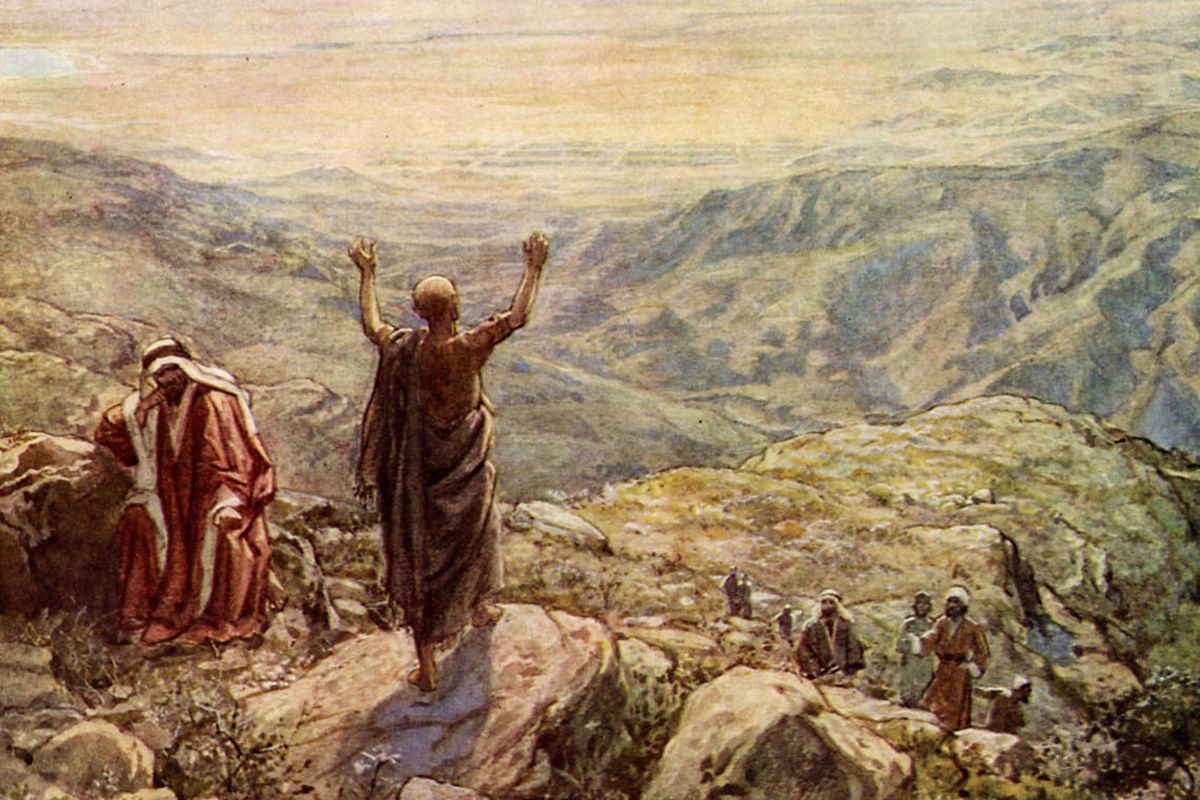This is adapted from a drash Z. S. will read this weekend at Devar Emet Messianic Congregation. A drash is a brief takeaway from the weekly cycle of texts.
This Week’s Readings:
Torah: Numbers 22:2-25:9
Haftarah: Micah 5:6-6:8
Brit Chadashah: Romans 11:29-12:2
Have any of you had a conflict with someone you loved and cared for? In the course of such a conflict, have you ever had a moment where, unbeknownst to them, you look at that person going about life in their usual manner, and you are able to see them in a positive light? Tevye from Fiddler on the Roof has this kind of a moment when he sings his “Little bird, little Chavaleh” song. Right after learning that his daughter Chava had run away and married a local Christian (obviously against his will), he pictures her dancing and doing all the things she loved, and he compliments her and recalls the hopes he had for her. It’s a sweet, tender moment. For you, maybe you just had all your energy drained by a child who insists on fussing instead of going to sleep—and then, kadunk! they crash into a deep, peaceful sleep. One second you were resenting their presence, but the next second, as soon as they fall asleep, you look at them and realize again how much you love them and how beautiful they are. For a moment you forget all about their inconvenient rambunctious energy, their disobedience, any conflicts that took place during the day. You think about all the good things you want for the child, things they’re not even aware of. I think Balaam’s blessings for Israel give us a glimpse into how God sees us this way.
This week’s Torah portion is one of my favorites. It begins with a narration of King Balak realizing his desperation in the face of Israel and awkwardly pursuing the services of Balaam to curse Israel. And then a talking donkey turns out to be more aware of God’s presence than Balaam the seer. When Balaam reaches Balak, all their contrivances to work out a curse for Israel get turned on their back. Balak offers God twenty-one bulls and twenty-one rams on twenty-one altars, but God only grants blessings for Israel. All the comical story elements aside, these blessings are some of the most beautiful poetry. We hear the beginning exclamation, “How lovely are your tents, O Jacob, and your dwellings, O Israel!” (24:5) which opens our ma tovu prayer. This blessing praises Israel for both refinement and strength. We also hear God’s promise for Messiah: “A star will come from Jacob, a scepter will arise from Israel” (24:17). In one of the blessings, we see God’s vision for Israel: “Look, he lives as a nation apart, and does not consider himself as being like the other nations” (23:9). But those of us who know our Bible history know that Israel did not meet this standard. God uses Balaam’s mouth to express how He sees Israel, what He wants for Israel. These blessings, while true and effective, give us an idealized image of Israel. They will be fulfilled through the work of Messiah, but the present reality is quite different. Immediately following these blessings, we read about the idolatry and sexual sin of the Israelite men. Moses fails to adequately discipline the Israelites for their sin. It took violent, unilateral action from Pinchas for Israel to wake up to their evil and for God to relent of a deadly plague. The Torah juxtaposes the good God sees for us with our present dirty reality.
Remember how Balak offered up twenty-one bulls and twenty-one rams in a mistaken attempt to curry up favor with God to curse Israel? Well, in our Haftarah portion, Israel has fallen into the same transactional relationship with God. They treat sacrifices like a get-out-of-jail-free card. With one hand they offer up sacrifices to cover all their bases, and with the other hand they do evil. Micah reminds them of the good will God showed Israel when He ignored Balak’s sacrifices and blessed Israel. Then Micah asks a scary question: how are we to approach God? Our sacrifices—no matter how generous—mean nothing as long as we live in sin. Instead, God demands that we practice justice, love mercy, and walk humbly with Him.
In our Brit Chadashah reading, Paul tells us what a true sacrifice requires. It is not so much the killing of animals or the libation of oil as it is the way we live. God requires that we present ourselves to Him “as a living sacrifice—holy, acceptable to God.” We must renew our minds to discern God’s will for us, the good that God wants for us, His children.
Yeshua (Jesus) was the ultimate living sacrifice: not just by His death, but also by His perfect life. He lived a holy life fully in tune with God’s will. We saw how God turned Balak’s intention for curse into a blessing for Israel. God also made Yeshua, “the One who knew no sin, to become a sin offering on our behalf, so that in Him we might become the righteousness of God” (2 Corinthians 5:21). Through Messiah’s living sacrifice, God continues to see us as He saw Israel when He planted those blessings in Balaam’s mouth. Following Messiah’s example, let us walk humbly with our God and present ourselves as a living sacrifice, holy and acceptable to God. May we live out God’s vision for us, from special times set aside for worship to the most mundane moments of our everyday life, when God sees us and smiles.


Leave a Reply